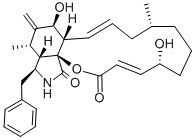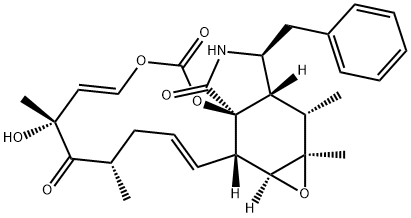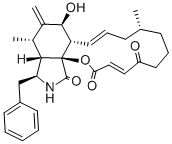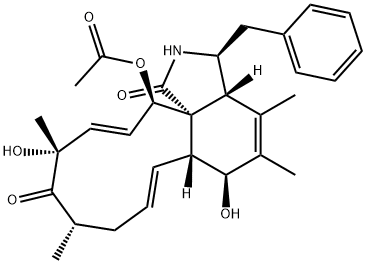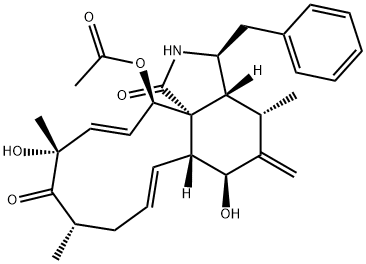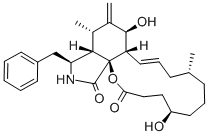Cytochalasin B , 98% , 14930-96-2
Synonym(s):
Cytochalasin B, Helminthosporium dematioideum - CAS 14930-96-2 - Calbiochem;Phomin
CAS NO.:14930-96-2
Empirical Formula: C29H37NO5
Molecular Weight: 479.61
MDL number: MFCD00077704
EINECS: 239-000-2
| Pack Size | Price | Stock | Quantity |
| 1MG | RMB557.60 | In Stock |
|
| 5MG | RMB1519.20 | In Stock |
|
| 25mg | RMB5439.20 | In Stock |
|
| others | Enquire |
PRODUCT Properties
| Melting point: | 218-223 °C |
| Boiling point: | 577.96°C (rough estimate) |
| Density | 1.1490 (rough estimate) |
| refractive index | 1.6290 (estimate) |
| Flash point: | 85℃ |
| storage temp. | -20°C |
| solubility | ethanol: 20 mg/mL |
| form | powder |
| pka | 13.60±0.70(Predicted) |
| color | white |
| Merck | 13,2819 |
| BRN | 1096207 |
| Stability: | Stable for 2 years from date of purchase as supplied. Solutions in DMSO may be stored at -20°C for up to 1 month. |
| InChIKey | UXVDBQLLXVKPRS-UZBFCAAUSA-N |
| LogP | 3.370 |
| EPA Substance Registry System | Cytochalasin B (14930-96-2) |
Description and Uses
Cytochalasin B (14930-96-2) is a cell permeable fungal toxin which binds to the barbed end of actin, inhibiting its polymerization.1 Inhibits cell division, migration and glucose transport.2 Causes cell cycle arrest at G2/M and induces apoptosis in HCT-116 colorectal carcinoma cells.3? Cytochalasin B-induced membrane vesicles (CIMVs) retain cell surface receptors of the parent cells and retain fusion specificity with target cells.4 CIMVs are a promising new vector system for drug and biomolecule delivery due to their natural origin and participation in intercellular communication.5
A cell-permeable fungal toxin used in actin polymerization studies and cytological
Safety
| Symbol(GHS) |   GHS06,GHS08 |
| Signal word | Danger |
| Hazard statements | H300+H310+H330-H361 |
| Precautionary statements | P201-P202-P260-P280-P302+P352+P310-P304+P340+P310 |
| Hazard Codes | T+,T |
| Risk Statements | 26/27/28-63-23/24/25 |
| Safety Statements | 28-36/37-45 |
| RIDADR | UN 1544 6.1/PG 2 |
| WGK Germany | 3 |
| RTECS | RO0205000 |
| F | 10 |
| HazardClass | 6.1(a) |
| PackingGroup | I |
| HS Code | 29349990 |
| Hazardous Substances Data | 14930-96-2(Hazardous Substances Data) |
| Toxicity | LD50 intraperitoneal in mouse: 30mg/kg |

